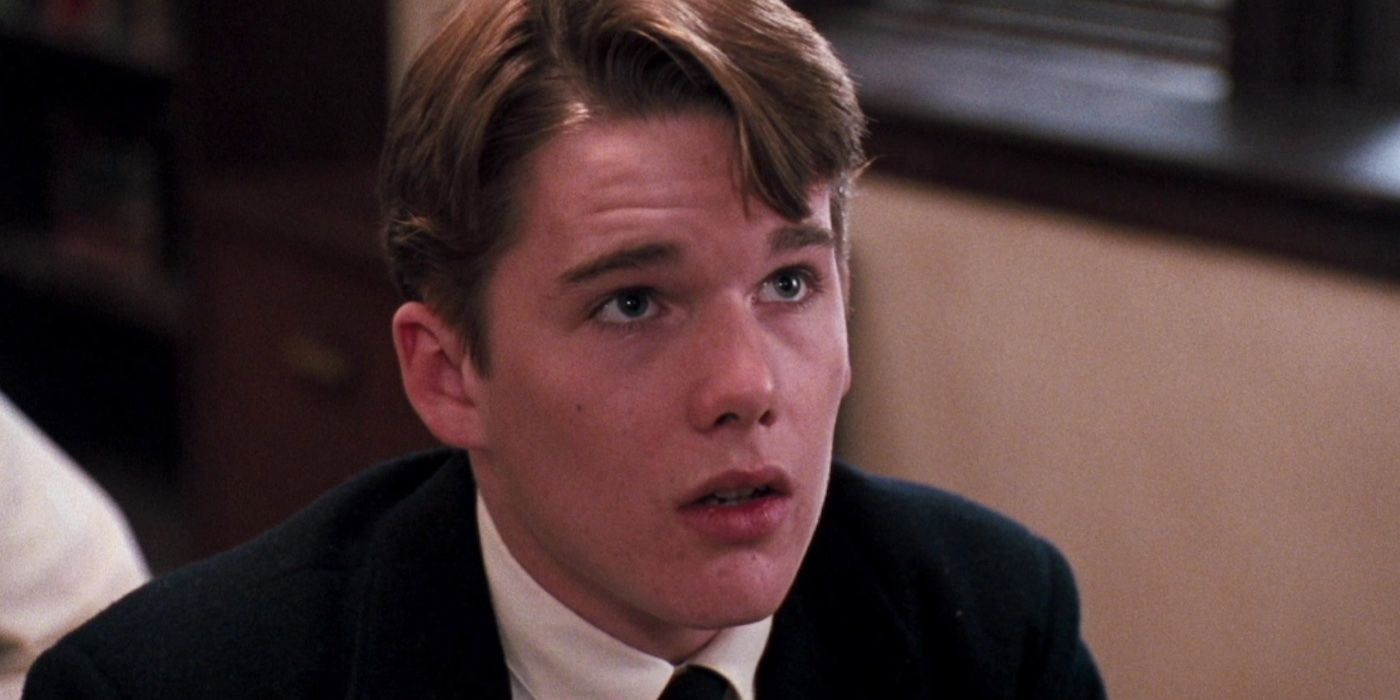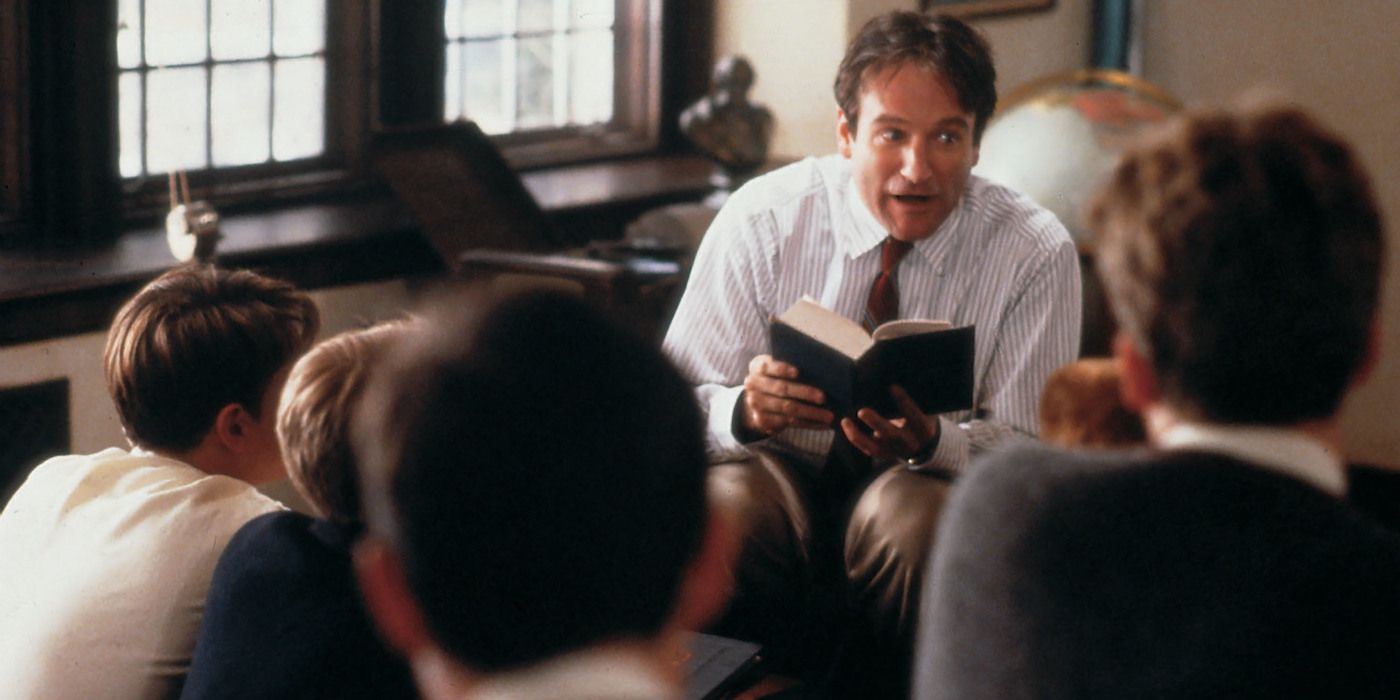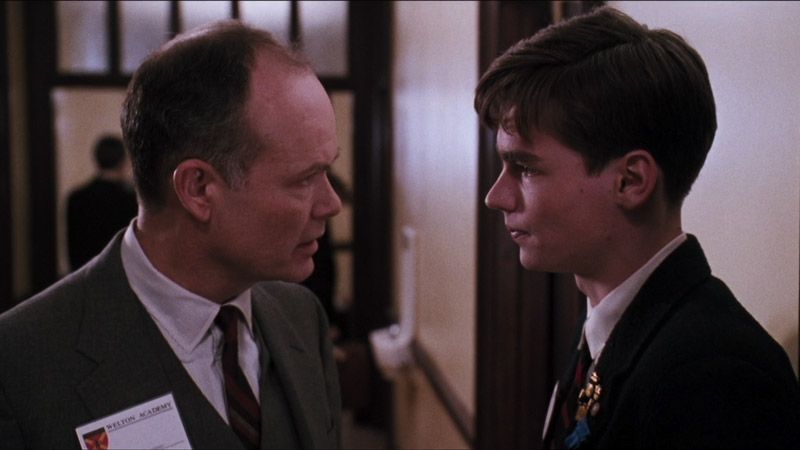Plenty of films have queer subtext. Whether it be intentional or unintentional the subtext can seep into a film in a variety of ways and offer some interesting insight into the film and its characters. Sometimes it can be as simple as some homoerotic tension in a buddy action flick and other times it can lie in the more minute details of themes or presentation. Like any lens you can apply to film, a queer lens simply offers us another dimension in which we can interrogate a film and its meaning. But some films are suited to this kind of analysis more than others. And if one were to ask some queer film theorists about films with noticeable gay subtext, you wouldn’t have to ask many before you hear about Dead Poets Society.
Dead Poets Society (1989) directed by Peter Weir is a film that needs little introduction. The film is widely acclaimed for both its story and performances. The story follows John Keating (Robin Williams), a new English teacher at the prestigious Welton Academy with a different approach to teaching. Keating is a breath of fresh air in the oppressive halls of Welton. With his encouragement and teaching Neil Perry (Robert Sean Leonard), Todd Anderson (Ethan Hawke), and their other classmates begin to come out of their shells and express themselves. Despite its 1950s setting it proved to be a timeless piece about adolescence and coming of age. And like any beloved film it’s been subject to years of critical analysis and fan discussion.
The film is not explicitly queer but critics and queer viewers have been reading into the queer subtext of this film for years. It’s a reading that not only offers an interesting new perspective on an already brilliant film but also one that can enhance one’s own engagement and understanding with the film's characters.
One of the first things many queer viewers notice when watching the film for the first time is just how much the story mirrors one’s struggles to live as a queer person. Welton Academy enforces tradition in all of its students from the very first scene where they emphasize how their conformity to tradition has produced academic excellence, but we quickly see how this excellence is at the expense of the student’s sense of self. The students of Welton must conform to the standards of the school and society at large in order to be successful, and they are penalized and criticized when they fail to do so. While this experience is not exclusive to queer people, enforced conformity is certainly something that resonates with queer viewers and this association only grows stronger when we get to know our characters.
Neil Perry is an overachiever. Like most of the other students at Welton, his parents have planned out his entire life, and he’s just along for the ride. But Neil longs to express himself, and he finds an outlet for this through Mr. Keating. His class opens up a world of literature and performance that Neil is immediately enthralled by. Over the course of the film he comes out of his shell through the Dead Poets Society, his friendship with Neil that pushes them both to be more authentic, and the nurturing influence of Mr. Keating. He becomes enthralled with acting and even gets a role in a production of A Midsummer Night’s Dream. But his dreams come crashing down when his parents find out and reject his passions entirely. And in the end, rather than not being able to be himself, Neil takes his own life.
It’s not hard to see how Neil’s story could be a metaphor for queerness. He’s a young man coming of age and finally beginning to find himself under the influence of an understanding adult who finally lets him be himself and friends who applaud him for doing so. He’s drawn to acting, something belittled and viewed as feminine, lesser by his parents. Neil becomes his truest self over the course of the film and when that truth is discovered by his parents they reject it outright. This could quite easily be swapped out for Neil being gay. He comes to accept what he wants in the safety of the community he’s created but that space is destroyed when his parents discover his identity and take him away from that community. It’s a tragic story but unfortunately not an unfamiliar one.
Todd Anderson has a slightly less obvious queerness to him. He’s similarly stifled by the expectations of his parents, particularly to live up to the heights achieved by his older brother. Todd is a quiet and insecure boy who starts to come out of his shell when Mr. Keating notices and encourages his talent for writing. His story is about learning to be and accept himself. He’s always bent to the pressure of others especially his parents, even going so far as to sign the letter accusing Mr. Keating of being responsible for Neil’s death when pressured to do so. Yet in the end he’s able to stand on his own two feet and say “O Captain, My Captain” as Mr. Keating departs in his boldest act of defiance ever. It’s in the face of losing his two largest pillars of support, Keating and Neil, that Todd is finally able to find the strength to be defiant.
Todd’s queerness can be seen as a more repressed kind than Neil’s. Neil is discovering this new aspect of himself only to be rejected for it meanwhile Todd seems to be aware of his own nature and preemptively represses it. It’s with the encouragement of his new friends and teacher that he opens up finally and expresses himself authentically. His queerness is self-repressed in order to appease others but as he sees Neil’s defiance and the acceptance of his friends he’s able to start acting of his own accord. The poem that Mr. Keating gets him to perform where he lets himself loose and battles a sweaty-toothed madman, confronts the concept of truth, expresses a transgression. His dissatisfaction with life and the way he’s been ordered to live is apparent and only through art is he able to be authentic. Todd is himself but he is also that sweaty-toothed madman, choking himself and telling him truth (or what it proclaims is truth) is enough, but Todd knows it’s a lie. Todd is a queer person so inundated with the world telling him he’s wrong that he eventually started to believe it but throughout the movie he sparks back to life and questions the truth he’s been forced to accept. He is not victorious against the oppressive force of the society he lives in, but he stands defiant in the end anyway.
The relationship between Neil and Todd is notable in many ways. Their closeness is a major factor that drives both of them to pursue their passions. Neil encourages Todd’s writing and Todd admires Neil’s pursuit of acting though he fears for both of them. Their relationship, through this lens, could be seen as a sort of doomed first love. They are able to be themselves with each other, but the world at large is not accepting. When Neil dies, Todd is the most bereft. The other boys have known him longer but Todd’s closeness to Neil was unique and seeing Todd sit broken in the snow after hearing of Neil’s death it’s indiscernible if he’s mourning a friend or lover. The relationship between the two boys is a driving force for their characters. As they both come into their own, they grow closer but that closeness is challenged and destroyed by the enforcement of conformity by those around them.
Even outside the two leads there are other elements of queerness in the film that make this critical lens feel fitting. Charlie (Gale Hansen), in particular, is a beacon of nonconformity. Though it starts as a joke, his persona as Nuwanda expresses a transgression from gender norms that evokes queerness. He dons lipstick as a form of self-expression and takes on a more effeminate persona which allows Charlie to act in a more authentic way. There’s also the prominent inclusion of the works of Walt Whitman, himself a queer man. His words are used to encourage the boys to be themselves and seize the day which, when the characters too are viewed as queer, bolsters a message of self acceptance and defiance that was already in the text proper.
Dead Poets Society is not a queer film, but it is a film that, knowingly or not, dips its toes into aspects of queer experience. Reading the characters or the film as queer adds an extra dimension to the story. It offers up another aspect of the self that these characters are learning to define for themselves rather than accepting what they’re told to be. The film is about striving to live in the moment and be authentic even in the face of adversity. It’s a message that is universal yet also uniquely pertinent to the queer experience. Neil, Todd, Keating, and their friends face countless obstacles that seek to tell them who and how they should be, yet they seek to define it for themselves, rejecting the notion that society must dictate their entire being. Queer people are intimately familiar with that experience, our entire existence is one of defiance. And with that defiance we bring forth unique and wonderful beings all with our own stories to tell, our own verse to contribute. Dead Poets Society shines even more brightly through this queer lens because it reveals something in the story and characters that makes it feel even more authentic.



